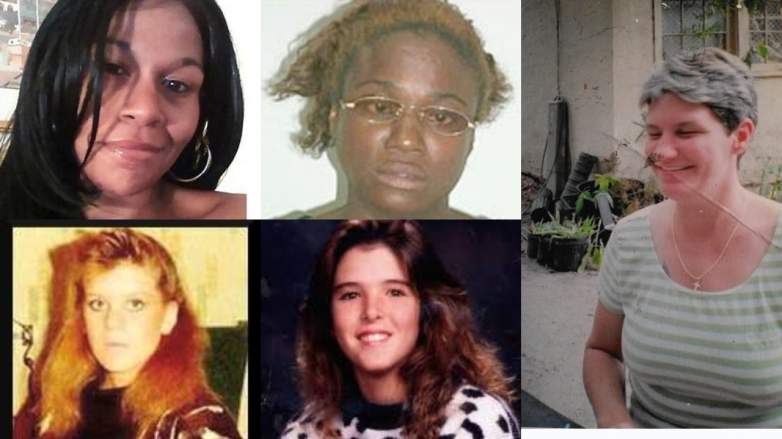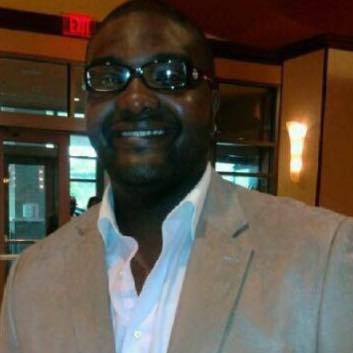
Robert Hayes is a 37-year-old Florida man charged with the 2016 murder of a woman in Palm Beach County. Hayes is also suspected of being the Daytona Serial Killer, who police believe is responsible for the murders of at least four women in Daytona Beach between 2005 and 2007.
Hayes was arrested September 15, 2019, in the murder of 32-year-old Rachel Bey, authorities announced at a press conference on Monday, September 16. He was tied to that case by DNA. Investigators have also used DNA to identify Hayes as a suspect in two of the Daytona Beach murders and have tied him to a third murder through ballistic evidence, officials said at a press conference.
Hayes has been charged with first-degree murder in Bey’s death. He didn’t resist when arrested Sunday by a Palm Beach County Sheriff’s Office tactical unit at his West Palm Beach home, the sheriff’s office said.
He is suspected, but not yet charged, in the Daytona Beach deaths of Laquetta Gunther in 2005, Julie Green in 2006 and Iwana Patton in 2006. Detectives are working to connect him to a fourth murder, of Stacey Gage, that occurred in Daytona Beach in 2008 and had many similarities to the first three killings. The four women in Daytona Beach and Bey had all worked as sex workers, according to police. The Daytona Serial Killer was known to target prostitutes and would leave semen at the crime scene, according to police.
Palm Beach County Sheriff Ric Bradshaw said at the press conference, “Through a fantastic team effort between ourselves, the FLDE, the state’s attorney’s office and our counterparts up in Daytona Beach we’ve been able to take what we believe is a serial killer off the streets and had we not done this, we’re pretty sure he would have killed again.”
Palm Beach Sheriff’s Office Captain Michael Wallace told reporters, “We have our guy. As the sheriff said, we believe we have taken a serial killer off the streets. We will be looking for additional victims.”
The Florida Department of Law Enforcement’s genetic genealogy team was a key part of the investigation. Advances in genetic technology and databases of genealogical data, including DNA, have helped investigators solve cold cases around the country in recent years, including the Golden State Killer case and many others. Investigators are able to take DNA from a crime scene and run it through online genealogy databases to find a familial match, and then use that match to identify a possible suspect.
Special Agent Troy Walker of the FDLE’s Miami region said the case is “high priority.” He added, “I believe you will be hearing a lot about Robert Tyrone Hayes in months to come. But to this point he has only been charged with Miss Bey’s murder, but there is a strong indication that he may have been involved in three other cold case homicides in Daytona Beach. The investigators are continuing to work those investigations.”
Here’s what you need to know about Robert Hayes:
1. Investigators Watched Robert Hayes While He Smoked After Identifying Him as a Suspect in the Palm Beach Murder & Then Collected His Discarded Cigarette to Get His DNA
Rachel Bey was found dead on March 7, 2016, on a highway near Jupiter, Florida, according to court documents. Her nude body was located about 8:15 a.m. by a road crew worker in the shoulder of the road near a construction project. Police said she was killed elsewhere and her body was moved there. According to police, Bey was severely beaten, sexually assaulted and strangled to death. Investigators obtained semen of an unidentified male to create a DNA profile.
Bey had last been seen by a friend in West Palm Beach with her cell phone. The phone was not located. But investigators did find that Bey’s cell phone remained active in the days after her death, and data indicated it was in an area that includes Hayes’ home on North Flagler Drive in West Palm Beach, according to court documents. His home was less than a mile away from where Bey had last been seen, police said.
After Hayes was identified using a genealogy database as a possible suspect in Bey’s death, police began surveillance of him. The Palm Beach County Sheriff’s Office’s Fugitive Task Force saw Hayes smoking on September 13 and watched him discard the cigarette while waiting for a bus near his home. According to court documents, investigators collected the cigarette and sent it to the FDLE lab to compare to DNA recovered in the Bey murder, and two of the Daytona Beach cases.
“On Saturday, September 14, 2019, DNA analysis was completed by the Florida Department of Law Enforcement Forensic Biology Unit. The results were as followed: The observed DNA profile is greater than 700 billion times more likely to occur if the sample originated from Robert Tyrone Hayes than from an unrelated individual.”
Police said they know Bey and Hayes had come into contact earlier in the evening before she was found dead, but how they came into contact, isn’t known for sure.
You can read the full criminal complaint here.
At a press conference, Lori Napolitano, the head of the FLDE’s genetic genealogy team, said, “I would like to extend our condolences to the family of Rachel Bey. Please know we worked countless hours on her case to bring it to resolution and to give Rachel the voice she lost.”
Napolitano said, “Genetic genealogy provides leads to investigations based on DNA matches to relatives found in genealogy databases. Investigators uploaded the crime scene DNA profile of the suspect and received a list of matches. Those matches are people who share DNA with the suspect. The more DNA they share, the more closely they’re related.”
2. He Was a Student at Bethune-Cookman University During the Time of the Daytona Murders & Was Interviewed by Police Because He Bought a Gun Similar to One Used in the Killings

Murder victims, clockwise from top left: Rachel Bey, Iwana Patton, Laquetta Gunther, Stacey Gage and Julie Green.
According to court documents, Robert Hayes was living in Daytona Beach and was attending Bethune-Cookman University when the Daytona Serial Killer murders occurred between 2005 and 2007. Laquetta Gunther, 45, was killed on Christmas Eve in 2005. Julie Green, Gunther’s 34-year-old friend, was murdered on January 14, 2006. Iwana Patton, 35, was killed on February 24, 2006. Stacey Gage was murdered January 2, 2008. Police do not have DNA or ballistics evidence from Gage’s case to tie her death to the others, but investigators have said her murder is similar to the others.
Police said in the affidavit filed before Hayes’ arrest that DNA taken from the crime scenes in the murders of Gunther and Green matched DNA from the scene of Rachel Bey’s murder. The DNA has all since been connected to Hayes, according to police. Investigators used ballistic evidence to connect Hayes to Patton’s murder.
The four Daytona victims were all fatally shot with a .40 caliber firearm, according to police. Hayes lived in the same area where Gunther, Green and Patton were all last seen prior to their deaths, according to court documents.
Hayes was questioned twice by investigators during the initial probe into the Daytona Beach murders because he owned a .40 caliber gun that he had recently purchased, according to court documents. He bought the gun in early December 2005, not long before Gunther was shot dead on Christmas Eve. In March 2006, Hayes told police he had given the gun to his mother, who lived in West Palm Beach, according to court documents. But police said Hayes also reported a .40 caliber firearm as being stolen from his vehicle in Riviera Beach in December 2006.
“His name did pop up earlier in the investigation, but we didn’t have enough evidence to think he was even linked to it. There were so many people we interviewed. We interviewed hundreds of people and he was one of them,” Daytona Beach Police Chief Craig Capri said at a press conference addressing the Volusia County aspects of the case.
“As the years go by, one thing we do in law enforcement we just don’t come to a dead end and say OK, the case is over, we continue to work and work and work, utilizing DNA and other technology to try to solve every open case and get closure for the victim and the victim’s family members,” Capri said “I can tell you that a lot of forensic evidence was collected at those scenes and it was part of the investigation.”
The case remains active, Capri said. He said they are working with Palm Beach County to put together a “solid case” to make sure “this murderer, disgusting serial killer who is off the streets now never gets out.”
Volusia County State’s Attorney RJ Larizza told reporters, “These were brutal crimes. The investigations are ongoing in the Daytona Beach cases so that we can make sure that we bring justice, and when I say justice folks say that word a lot and I’m not sure they know what it means, but what it means in this case is to hold the individual accountable for these brutal and senseless violent murders.”
Larizza said they will file charges in the Daytona Beach cases at the “appropriate time.”
3. Hayes Has Previous Arrests on His Record for Minor Offenses, Including Theft & Disorderly Conduct, but Was Not Convicted in Those Cases
Robert Tyrone Hayes does not have any convictions on his record except for traffic offenses, authorities say. But he has been arrested in other cases, online records show, but was not convicted. Those were also low-level misdemeanor charges.
Hayes was arrested in Palm Beach County in August 2003 and charged with petit theft. On November 20, 2003, prosecutors dropped that case. He was also arrested in May 2006 in Palm Beach County on a charge of disorderly conduct. That case was also dropped by prosecutors. Details of those arrests were not immediately available.
In North Carolina, Hayes has been arrested on charges of driving without a license, operating a motor vehicle without insurance, speeding and driving with a revoked or suspended tag, online records show.
4. He Has Worked at Bethune-Cookman, at One Point Held a Security Officer’s License & Is Listed in Court Documents as a Cook

Robert Hayes.
Hayes has lived in West Palm Beach, Florida, where he currently resides, since at least 2002, according to public records. He has also lived in Charlotte, North Carolina; Riviera Beach, Florida; Atlanta, Georgia; and Daytona Beach, Florida, according to records.
A Linkedin profile for Hayes shows that he once worked as a case manager at Bethune-Cookman University, his alma mater. His occupation is listed in court records as a cook, but no employer is listed. Online records show that Hayes previously held a security officers license while living in Daytona Beach. That license expired in 2007.
Palm Beach County Sheriff’s Office Captain Michael Wallace said, “The modus operandi, how Mr. Hayes chose his victims and killed them, our case with Rachel Bey is very similar to those up in Daytona. Again it is an open investigation because of the Daytona cases, we also are looking for where Mr. Hayes lived. We know he was here when Ms. Bey was killed, we are looking through that time span to see if there are any other victims anywhere else.”
5. Hayes Is Being Held Without Bail After Making His First Court Appearance on September 16
Robert Hayes made his first court appearance on September 16, and was held without bail. It is not clear if he has hired an attorney who could comment on his behalf.
State’s Attorney David Aronberg said, “It was technology that led to the capture of this defendant. But technology doesn’t operate in a vacuum. It also takes cooperation and a partnership and it’s that partnership that we have with law enforcement that helped lead to today.”
Aronberg said Rachel Bey’s brothers were at the press conference.
“You remind us that this is all about Rachel Bey,” Aronberg said. “That’s why we’re here. And we will do justice for her.”
Sheriff Bradshaw said he spoke to Bey’s brothers and they told him, “thank you for not giving up.” Bradshaw said, “the team that you are looking at here will never, ever give up. I don’t care if it’s one year, 10 years, 20 years, 30 years, we will keep working every single day, every single hour until we find these monsters who are out here who do these things. Because I can tell you folks if we hadn’t put this individual in jail he would’ve done this again and we’d have another innocent victim out here.”
At the press conference announcing Hayes’ arrest, FDLE Special Agent Troy Walker told reporters, “Killers like Robert Tyrone Hayes are the reason genetic genealogy is so important to public safety. Without genetic genealogy, predators like Mr. Hayes will continue to live in our neighborhoods, visit our parks, our restaurants and go to our nightlife and entertainment districts to continue to hunt for victims. There is a power in combining genealogy, analytics, forensics and investigative expertise to crack these type of cases. That is why FLDE committed resources to this area and it’s why FDLE and the state of Florida is a leader nationally of using the power of genetic genealogy to solve cases.”
Walker added, “Most importantly to us, this technique has a very real impact on public safety. Using genetic genealogy has stopped killers like these from continuing to kill our citizens and by arresting and taking them out of our communities forever.”
According to Lori Napolitano, the genetic genealogy team was formed by the FDLE about a year before Hayes’ arrest, to help Florida law enforcement agencies identify cold case murder and sexual assault suspects. She said they have identified four suspects in cold cases in Florida using genetic genealogy leads.
Napolitano said she believes there have been about 70 cases of rape and murder solved using genetic genealogy techniques across the country.
READ NEXT: Florida Teen Paid Men to Kill Her Parents: Sheriff